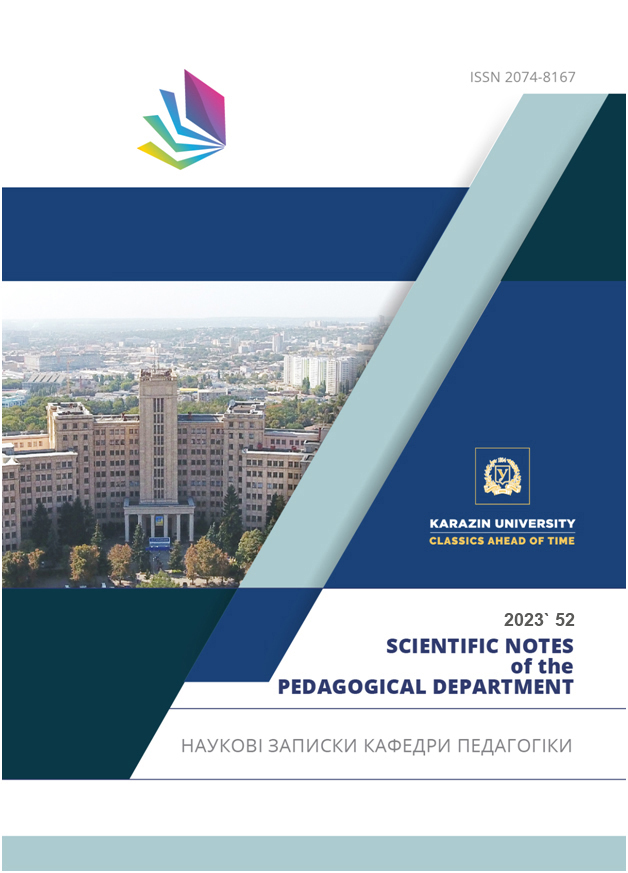Тенденції інтелектуального розвитку дошкільників в закладах дошкільної освіти Китаю
Анотація
Нині в Китайській народній республіці розвиток системи дошкільної освіти має вектор, спрямований на світову спільноту викладачів, які навчають майбутніх вихователів, учених та власне працівників закладів дошкільної освіти. Більшість науковців зазначає, що цей процес супроводжується суттєвими змінами в дошкільній освіті. Мінливий дошкільний освітній простір спрямовує свою роботу на розробку нових форм та методів навчання та виховання дошкільників, побудову індивідуальної траєкторії розвитку їхніх здібностей та задатків. Аналізуючи тенденції розвитку сучасних дошкільних освітніх закладів, дослідники зазначають, що в дошкільній освіті за останні роки виникла унікальна ситуація. Комплекс різних умов (нормативно-правових, адміністративних, економічних, соціокультурних) склався у певну систему, що дозволяє дошкільним установам здійснювати реформу власної діяльності.
Завантаження
Посилання
Han, Chunian. (2014). About the teaching of folk music and children’s development. Education and Teaching Forum. 12, 272-273. [in Ukrainan].
Itszian, H. et al. (2020). Normative base of modern aesthetic education in China. Means of educational and research work. 55, 102-137. [in Ukrainan].
Kalichak, Yu. (2018). Peculiarities of the functioning of non-state preschool education institutions abroad. Current issues of humanitarian sciences. 138. [in Ukrainan].
Lonh, Kh. (2014). The use of folk music in a kindergarten - on the example of a kindergarten in Wuhan. 47 [in Ukrainan].
Mykulina, A. K. & Synychka, Ye. B. (2019). Development of preschoolers in the process of making origami products. [in Ukrainan].
Pidlypniak, I. Yu. (2017). Logical and mathematical development of preschool children: peculiarities of the educational process. Scientific Bulletin of Uzhhorod University. Series «Pedagogy. Social work». 2(41), 194–198. [in Ukrainan].
Romanova,I.A.(2014). Comparative analysis of the use of intellectual games in the educational process. Pedagogy, psychology and medical and biological problems of physical education and sports. 3, 64-69. [in Ukrainan].
Sun, Ts. (2022). Formation of musical and creative abilities of preschool children in the People’s Republic of China using the Suzuki method: diss. - Kharkiv National Pedagogical University named after G. S. Skovoroda, 2022. [in Ukrainan].
Khao, Ch. (2021). Musical development of preschoolers through the eyes of Chinese and Ukrainian teachers. Means of educational and research work. 56, 83-107. [in Ukrainan].
Tszintsiu, S. (2019). Interpretation of the results of the formation of musical and creative abilities of preschool children in the People’s Republic of China using the Suzuki method. Scientific notes of the department of pedagogy. 1, 44. 251-259. [in Ukrainan].
Tsi, Y. (2013). Chinese folk music. Baoding: Hebei University Press, 401. [in Ukrainan].
Chzhan, Ts. (2015). Opens the door to wisdom and promotes comprehensive development: About the implementation of ethnic folk music in preschool music education. Theater house. 12. 204–205. [in Ukrainan].
Shelestova, L. V. (2017). Intellectual development of older preschoolers and first-graders: theory and practice. Education and development of a gifted personality. T. 6, 61. 21-26. [in Ukrainan].
Shparyk, O. (2019). Concepts of «educational development» and «educational reform» in the modern scientific discourse of Ukraine and China. Ukrainian Pedagogical Journal. 3, 38-49. [in Ukrainan].
Shutsziuan, B. (2019). Peculiarities of the development of preschool children in preschool education institutions in the People’s Republic of China. [in Ukrainan].
Cheung, K. C. K. & Wong, R. K. S. (2021). Income Effects on the Intellectual Development of Children from Low-Income Families in Hong Kong: The Mediating Role of Parental Investment and Parental Stress. Child and Adolescent Social Work Journal. T. 38, 337-346.
Guo, D. et al. (2022). Development of information integration in the visual working memory of preschoolers. Child development. T. 93, 6.1793-1803.
Song, H. Q., Lau, P. W. C. & Wang, J. J. (2022). Investigation of the motor skills assessments of typically developing
preschool children in China. BMC pediatrics. T. 22, 1. 1-17.
Wang, L. et al. (2020). Teacher qualifications and development outcomes of preschool children in rural China.
Early Childhood Research Quarterly. T. 53. 355-369.
Xie, G. et al. (2020). Digital screen time and its effect on preschoolers behavior in China: results from a cross-
sectional study. Italian journal of pediatrics. T. 46, 1. 1-7.

